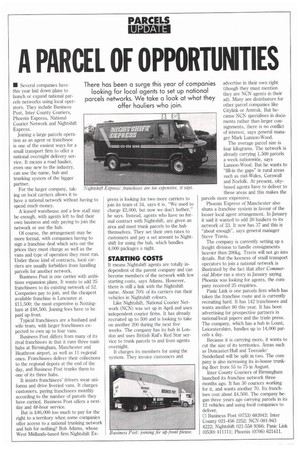A PARCEL OF OPPORTUNITIES
Page 28

If you've noticed an error in this article please click here to report it so we can fix it.
There has been a surge this year of companies looking for local agents to set up national parcels networks. We take a look at what they offer hauliers who join.
• Several companies have this year laid down plans to launch or expand national parcels networks using local operators. They include Business Post, Inter County Couriers, Phoenix Express, National Courier Network and Nightshift Express.
Joining a large parcels operation as an agent or franchisee is one of the easiest ways for a small transport firm to offer a national overnight delivery service. It means a road haulier, even one new to the industry, can use the name, hub and trunking system of the bigger partner.
For the larger company, taking on local carriers allows it to have a national network without having to spend much money.
A leased warehouse and a few staff may be enough, with agents left to find their own business and only paying to join the network or use the hub.
Of course, the arrangement may be more formal, with companies having to sign a franchise deal which sets out the prices they must charge as well as the vans and type of operation they must run. Under these kind of contracts, local carriers are usually forbidden from handling parcels for another network.
Business Post is one carrier with ambitious expansion plans. It wants to add 25 franchisees to its existing network of 52. Companies pay to join, and the cheapest available franchise is Lancaster at £11,500; the most expensive is Nottingham at £48,500. Joining fees have to be paid up-front.
Typical franchisees are a husband and wife team, with larger franchisees expected to own up to four vans.
Business Post differs from many of its rival franchisors in that it runs three main hubs at Birmingham, Manchester and Heathrow airport, as well as 11 regional ones. Franchisees deliver their collections to the regional depots at the end of the day, and Business Post trunks them to one of its three hubs.
It insists franchisees' drivers wear uniforms and drive liveried vans. It charges customers, paying franchisees monthly according to the number of parcels they have carried. Business Post offers a nextday and 48-hour service.
But is £40,000 too much to pay for the right to a territory when some companies offer access to a national trunking network and hub for nothing? Bob Adams, whose West Midlands-based firm Nightshift Ex
press is looking for two more carriers to join its team of 34, says it is. "We used to charge £2,000, but now we don't bother," he says. Instead, agents who have no formal contract with Nightshift, are given an area and must trunk parcels to the hub themselves. They set their own rates to customers and pay a set amount to Nightshift for using the hub, which handles 4,000 packages a night.
STARTING COSTS
It means Nightshift agents are totally independent of the parent company and can become members of the network with few starting costs, says Adams. However, there is still a link with the Nightshift name. About 70% of its carriers run their vehicles in Nightshift colours.
Like Nightshift, National Courier Network (NCN) was set up in April and uses independent courier firms. It has already recruited up to 500 and is looking to take on another 200 during the next five weeks. The company has its hub in London and uses British Rail's Red Star service to trunk parcels to and from agents overnight.
It charges its members for using the system. They invoice customers and advertise in their own right (though they must mention they are NCN agents in their ad). Many are distributors for other parcel companies like Citylink or Amtrak. But because NCN specialises in documents rather than larger consignments, there is no conflict of interest, says general manager Mark Lunnon-Wood.
The average parcel size is four kilograms. The network is already carrying 1,500 parcels a week nationwide, says Lunnon-Wood. But he wants to "fill-in the gaps" in rural areas such as mid-Wales, Cornwall and Norfolk. At present, citybased agents have to deliver to these areas and this makes the parcels more expensive.
Phoenix Express of Manchester also shuns a franchise system in favour of the looser local agent arrangement. In January it said it wanted to add 20 hauliers to its network of 33. It now has 37 and this is "about enough", says general manager Steve Travis.
The company is currently setting up a freight division to handle consignments heavier then 200kg. Travis will not go into details. But the keeness of small transport operators to join a national network is illustrated by the fact that after Commercial Motor ran a story in January saying Phoenix was looking for agents, the company received 25 enquiries.
Panic Link is one parcels firm which has taken the franchise route and is currently recruiting hard. It has 142 franchisees and wants another 80 this year. It has been advertising for prospective partners in national/local papers and the trade press. The company, which has a hub in Lount, Leicestershire, handles up to 14,000 parcels a day.
Because it is carrying more, it wants to cut the size of its territories. Areas such as Doncaster/Hull and Teesside/ Sunderland will be split in two. The company is also increasing its in-house trunking fleet from 55 to 75 in August.
Inter County Couriers of Birmingham launched its franchise network three months ago. It has 30 couriers working for it, and wants another 70. Its franchises cost about £4,500. The company began three years ago carrying parcels in its 12 vehicles and using local companies to deliver.
111 Business Post (0753) 682042; Inter County 021-456 2252; NCN 081-943 4222; Nightshift 021-558 9266; Panic Link (0530) 411111; Phoenix (0706) 621411.




























































































